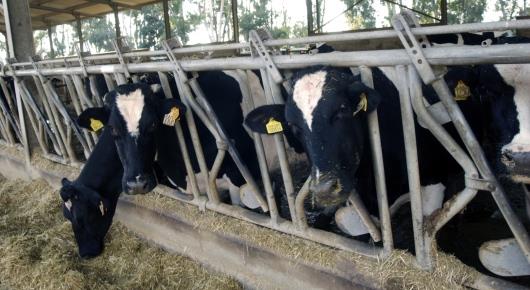Georgia gets ready for possible reemergence of cattle disease

Georgia is now better prepared to confront a new cattle disease, thanks to an emergency project from FAO that is winding up this week.
Georgia saw its first two outbreaks of lumpy skin disease (LSD) in late 2016. An insect-transmitted disease characterized by nodules in the skin, it translates into production losses. Eight infected cows were found in Racha, a mountainous region of the country close to the border with Russian Federation. The outbreak was resolved, with all eight animals being culled.
To prevent further spread of the virus, Georgia’s National Food Agency vaccinated cattle in the at-risk regions – along the country’s southern and eastern borders and in the area surrounding the outbreaks.
Still, there is a high risk that the disease will re-emerge in springtime, as the vectors (insects transmitting the virus) multiply and become active at this time of year.
At the request of the National Food Agency and veterinary services of Georgia, FAO initiated a capacity-strengthening programme for Georgian institutions working on control of LSD.
The country hosted two missions by FAO experts in early 2017. First, the FAO team carried out an evaluation of Georgia’s situation and provided technical assistance to the National Food Agency in creating an advanced control strategy for the disease. When the assessment showed LSD awareness was low among farmers and cattle traders, FAO developed informative leaflets and posters. The materials were made available in both Georgian and Azeri languages, in order to reach minorities, who often own cattle.
“One of the aims of this project was to raise the awareness of LSD,” said Daniel Beltran-Alcrudo, FAO animal health officer. “We targeted the network of private and abattoir veterinarians and the bigger cattle farmers. Our team brought FAO expertise to Georgia to handle the possible reappearance of LSD.”
FAO also provided training for staff of the National Food Agency and for field veterinarians. Clinical signs of LSD, epidemiology, essential prevention, control, eradication and vaccination against the disease were covered. Veterinary service specialists were advised on best practice for managing the disease.
“We shared up-to-date practical recommendations so that Georgian colleagues will be fully prepared,” Beltran-Alcrudo continued. “Advice included not only vaccination, cattle movement and insect control, but also keeping up the awareness campaign and surveillance programmes.” All of this will be reflected in a national contingency plan now being finalized with assistance from FAO experts.
Practical laboratory diagnostic training was the final phase of the capacity-strengthening programme in Georgia. Oran Erster – an expert from the Kimron Veterinary Institute in Israel – conducted training on molecular diagnostics of LSD for laboratory specialists from different regions in Georgia.
24 March 2017, Tbilisi, Georgia
